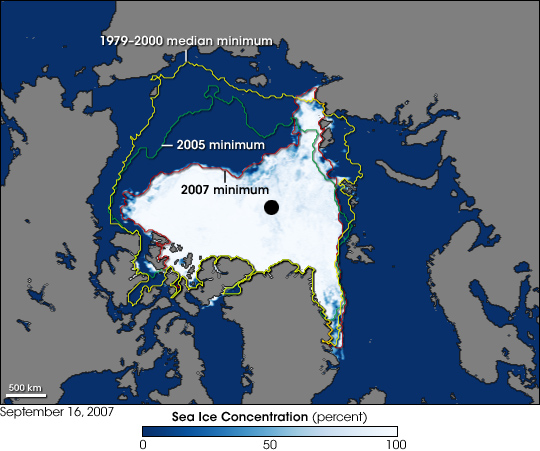finalrpgfantasy said:
because britain is close to the arthic, GW doesn't mean that snow and cold will dissapear. Is like that heat wave in 2003 in europe, northern europe was not effect that much compare to the center.
|
Few points, first NASA has attributed the low 2007 minimum and the preceding several years worth of ice loss to the changes in the winds. Not to rising temperatures in the arctic.
....
"Nghiem said the rapid decline in winter perennial ice the past two years was caused by unusual winds. "Unusual atmospheric conditions set up wind patterns that compressed the sea ice, loaded it into the Transpolar Drift Stream and then sped its flow out of the Arctic," he said. When that sea ice reached lower latitudes, it rapidly melted in the warmer waters.
"The winds causing this trend in ice reduction were set up by an unusual pattern of atmospheric pressure that began at the beginning of this century," Nghiem said."
....
When ocean ice migrates to lower latitudes it's going to melt. More to the point however I would point out that citing sea ice extent is somewhat comical at present given the (legitimate) calls of "Weather is not climate!" from several in this thread and around the debate in general in regards to recent snowfall totals (Something the GCMs didn't predict - in fact they predicted the opposite). 2007 was certainly a striking year if you just look at a line on a graph...but it was still one year and subsequent inquiries that go deeper than a line on a graph reveal a different story than the typical assumption of a warming arctic.
Second, on the issue of glaciers I would start by pointing out that glaciers are responsive to a whole lot more than simple temperature for their melt and growth. To see this in action you can look at some of the major glaciers that are in fact growing right now such as the Himalayan glaciers (among several others - I can get you links if needed). If global temperature changes were a primary driver of glacial melt this would not be the case (they are certainly important, but factors often local to the glaciers play a critical role as well), or to put it another way, it's more complicated than hot=melt, cold=grow.
From here I would point out that we are just now in the past couple of years getting quality measurements of glaciers and we are finding that our numbers might not be what we thought they were:
"Glaciologists at the Laboratory for Space Studies in Geophysics and Oceanography (LEGOS – CNRS/CNES/IRD/Université Toulouse 3) and their US and Canadian colleagues (1) have shown that previous studies have largely overestimated mass loss from Alaskan glaciers over the past 40 years. Recent data from the SPOT 5 and ASTER satellites have enabled researchers to extensively map mass loss in these glaciers, which contributed 0.12 mm/year to sea-level rise between 1962 and 2006, rather than 0.17 mm/year as previously estimated."
And finallly, I would add that we are currently in the midst of the Holocene Interglacial, several glaciers were formed when average global temperatures were 6C(~11F) lower than they are today over 12,000 years ago. And the real kicker is that for large extents of those 12,000 years the temperature has actually been a bit higher than it is now:
 |
The idea that now suddenly under this recent allegedly human induced warming the glaciers are just rapidly dissapearing as a result seems a bit far-fetched when you look at the full context of temperature on the timescales of a glacier's lifespan.
With all of that said it may actually be the case that glaciers are retreating right now, but understanding why is a lot more difficult than simply pointing out that they are (or pointing out that a few others are growing as I did, for that matter). Given the issues involved in accurately measuring glacier retreat/growth I find recent satellite data to be most reliable but I don't doubt that some glaciers are melting as your graph points out. But simply being in retreat is not abnormal for glaciers during any period over the last 12,000 years and it's certainly not a case for AGW.



















